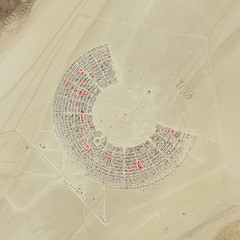
While yesterday’s article from The Atlantic, “The Rise of the Temporary City,” never addresses utopianism, we still think Erik Olin Wright, American Sociological Association president and champion of the study of “real utopias” would be pleased with the rise of “temporary urbanism.” In the piece, which jumps off of the new book The Temporary City, author David Lepeska points out that pop-up cities are nothing new (the World’s Fair’s various incarnations spring to mind), but the recent spate of pop-up stores, restaurants, and the like seems to be breathing new life into these short-lived utopias.
The truly quick cities—week-long urban malls, for instance—are intriguing on their own, but urban planner Peter Bishop tells The Atlantic that it’s the “grander, longer-lasting temporary projects that have begun to alter thinking in the field.” Various projects cited include London’s “Boxpark,” in which “60 shipping containers have been turned into shops with three or five-year leases… in large part due to the open-mindedness of the landowners”; the now-permanent Camden Lock Market, which has “helped rejuvenate an overlooked neighborhood”; and even city-wide projects like Washington, D.C.’s Temporary Urban Initiative, meant to help developers overcome the slow pace of owner approval, permitting, and zoning for such projects.
The author points out that whether the pop-ups are just a passing revival of a past fad remains to be seen and will likely be measured by scholars like Bishop on “the extent to which major colleges and universities incorporate temporary concepts into their curriculum, and uptake among municipal officials.” Still, “temporary urbanism offers an innovative way to use vacant space, generate revenue, and boost property values in a downturn.”
Further, such projects offer an excellent experimental space in which to create, from the ground up, a new community and see how it plays itself out: real utopias in action. If, as Wright instructs, we should study operational utopias (like Copenhagen’s Christiania, which has been in operation as a squatter settlement since the early 70s) in order to be ready to take action when opportunities arise to improve our larger communities, we could do worse than to study the temporary urbanism of the 21st century.

Comments